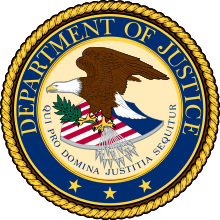Walter J. Cummings, Jr.
Walter Joseph Cummings Jr. (September 29, 1916 – April 24, 1999) was a United States Solicitor General and a federal judge.
Cummings was born in Chicago, Illinois to Lillian Garvy Cummings and Walter J. Cummings, Sr. The senior Cummings was ex-chairman of the board of the Continental Illinois National Bank and Trust Company, a member of the first board of the FDIC for five months, and treasurer of the Democratic National Committee from 1934 to 1936. After attending Chicago area schools, the junior Cummings received a B.A. from Yale University in 1937. At Yale, he served on the business staff of campus humor magazine The Yale Record with Roy D. Chapin, Jr. and James S. Copley.[1] He earned an LL.B. from Harvard University in 1940. That same year he was admitted to the Illinois bar and joined the staff of the U.S. Solicitor General, where he served until 1946. During that time, Cummings also served as a special assistant to the U.S. Attorney General in Washington, D.C., from 1944 to 1946.
In 1946, Cummings joined the Chicago law firm now known as Sidley Austin as a partner. He remained at the firm until 1966, taking his only leave of absence to become Solicitor General of the United States after President Truman’s December 1, 1952 appointment. At age 36, Cummings was the youngest Solicitor general to serve in the position.[2] His short SG service (from December 1952-March 1953) was during the transitional period between the presidencies of Harry S. Truman and Dwight D. Eisenhower. Cummings only appeared before the Supreme Court in matters concerning alleged violations of the civil rights of convicts in a Florida prison camp and a question concerning the constitutionality of the emergency strike section of the Taft-Hartley Act.
On July 11, 1966, Cummings was nominated by President Lyndon B. Johnson to a new seat on the United States Court of Appeals for the Seventh Circuit created by 80 Stat. 75. He was confirmed by the United States Senate on August 10, 1966, and received his commission on August 11, 1966. Cummings subsequently served as chief judge on the Seventh Circuit from 1981 to 1986, and was a member of the Joint Committees of Judicial Articles and Uniform Commercial Code. Cummings also acted as the grievance commissioner of the Illinois Supreme Court, member of the Judicial Conference of the United States, chairman of the Chicago U.S. Circuit Court Judges (1985–1986), as well as the subcommittee on judicial improvements, and chairman of the ad hoc committee on disposition of court records. In his spare time, Walter contributed his expertise to various law schools including Harvard, Stanford, Northwestern, and the University of Chicago as a committee visitors member. His interest in art was reflected in his position as a governing life member of the Art Institute of Chicago.
Cummings held various positions as a member of the American Bar Association, Illinois State Bar Association, Chicago Bar Association, and the Federal Bar Association. His social club memberships included the Yale Club (New York City), Metropolitan (Washington, D.C.), the Saddle and Cycle (Chicago), and the Union League.
Walter was married to Therese Farrell Murray (deceased November 1968) on May 18, 1946. The couple had three sons Walter J. III, Keith, and Mark. On April 24, 1999, Walter Cummings died at his home in Chicago.
References
- ↑ Yale Banner and Pot Pourri: Freshman Edition. New Haven: Yale University Press. 1937. p. 106.
- ↑ Honan, William H. (May 2, 1999). "Walter J. Cummings, 82, Dies; Appellate Judge Since 1966". New York Times. Retrieved March 9, 2013.
Sources
- Walter J. Cummings, Jr. at the Biographical Directory of Federal Judges, a public domain publication of the Federal Judicial Center.
| Legal offices | ||
|---|---|---|
| Preceded by Philip B. Perlman |
Solicitor General 1952–1953 |
Succeeded by Simon Sobeloff |
| Preceded by new seat |
Judge of the United States Court of Appeals for the Seventh Circuit 1966–1999 |
Succeeded by Ann Claire Williams |
